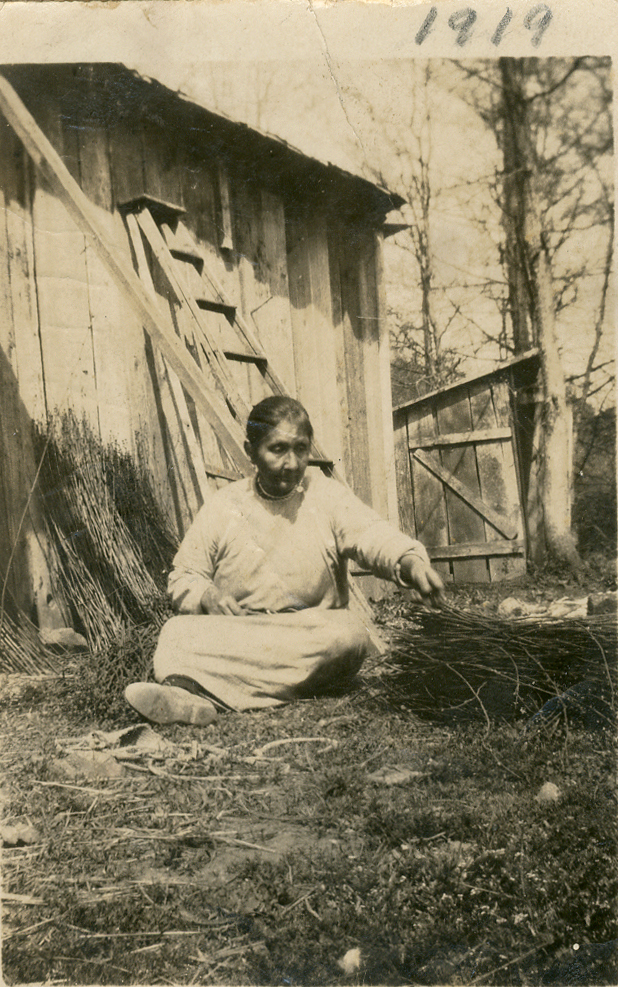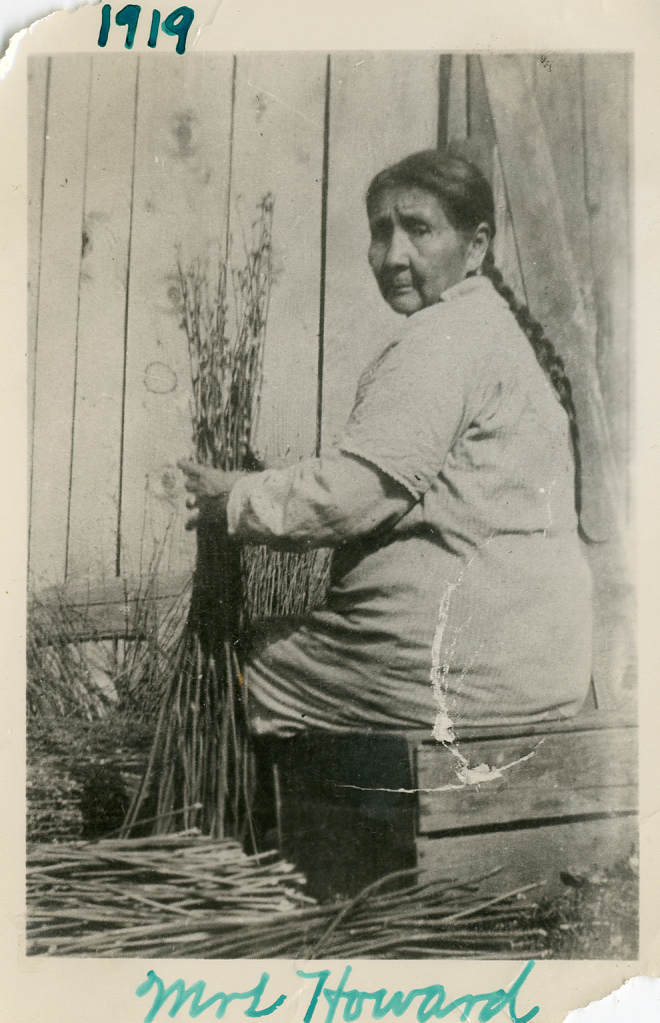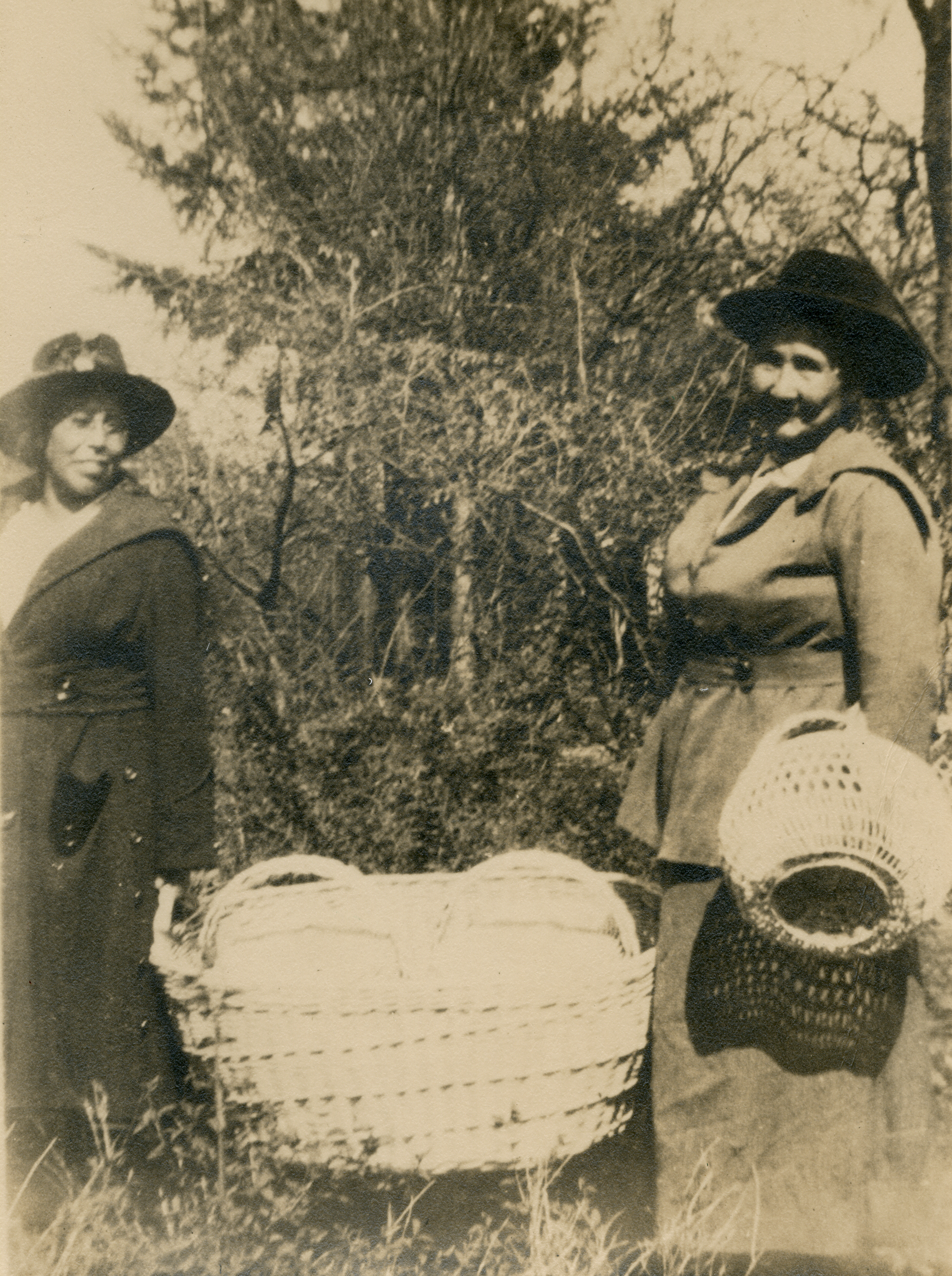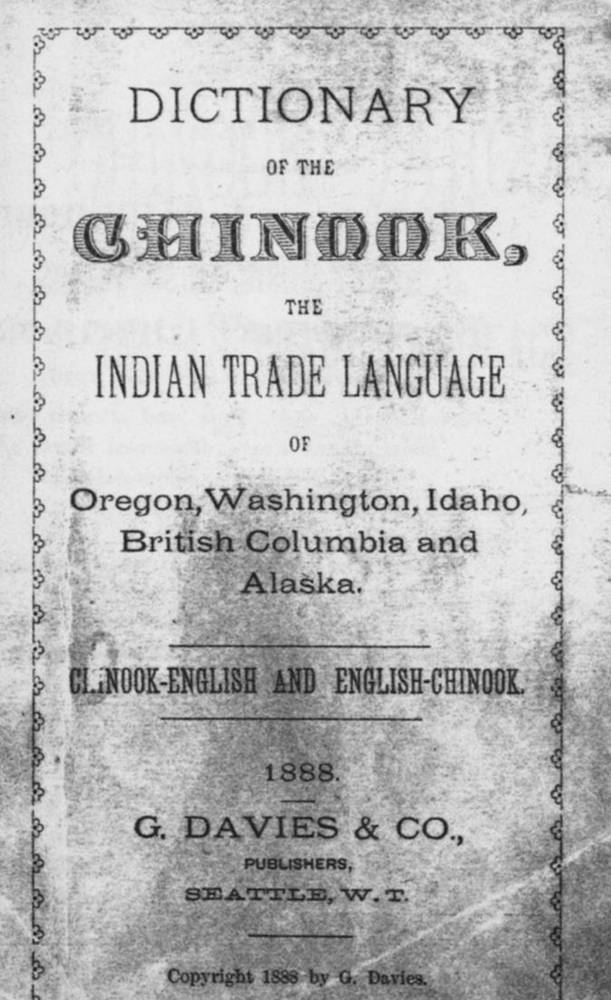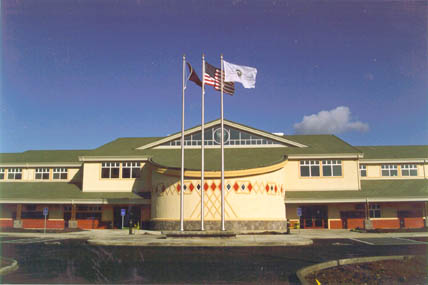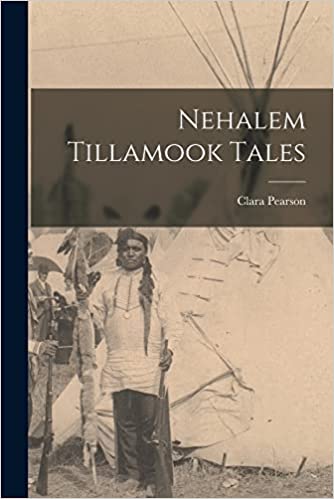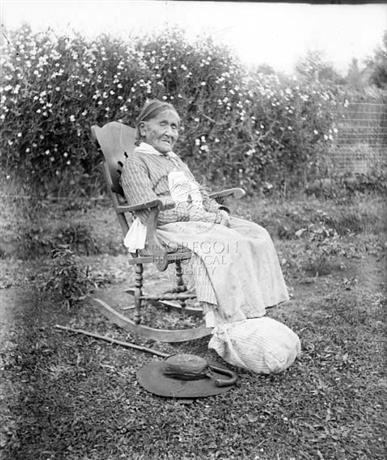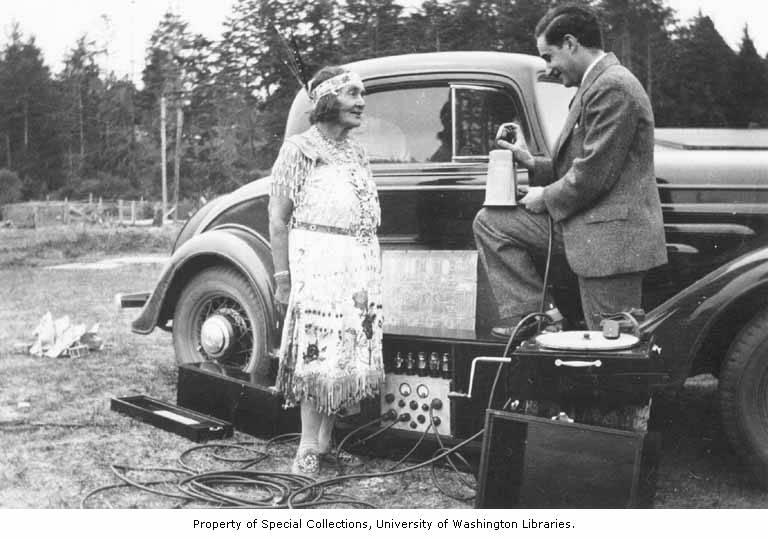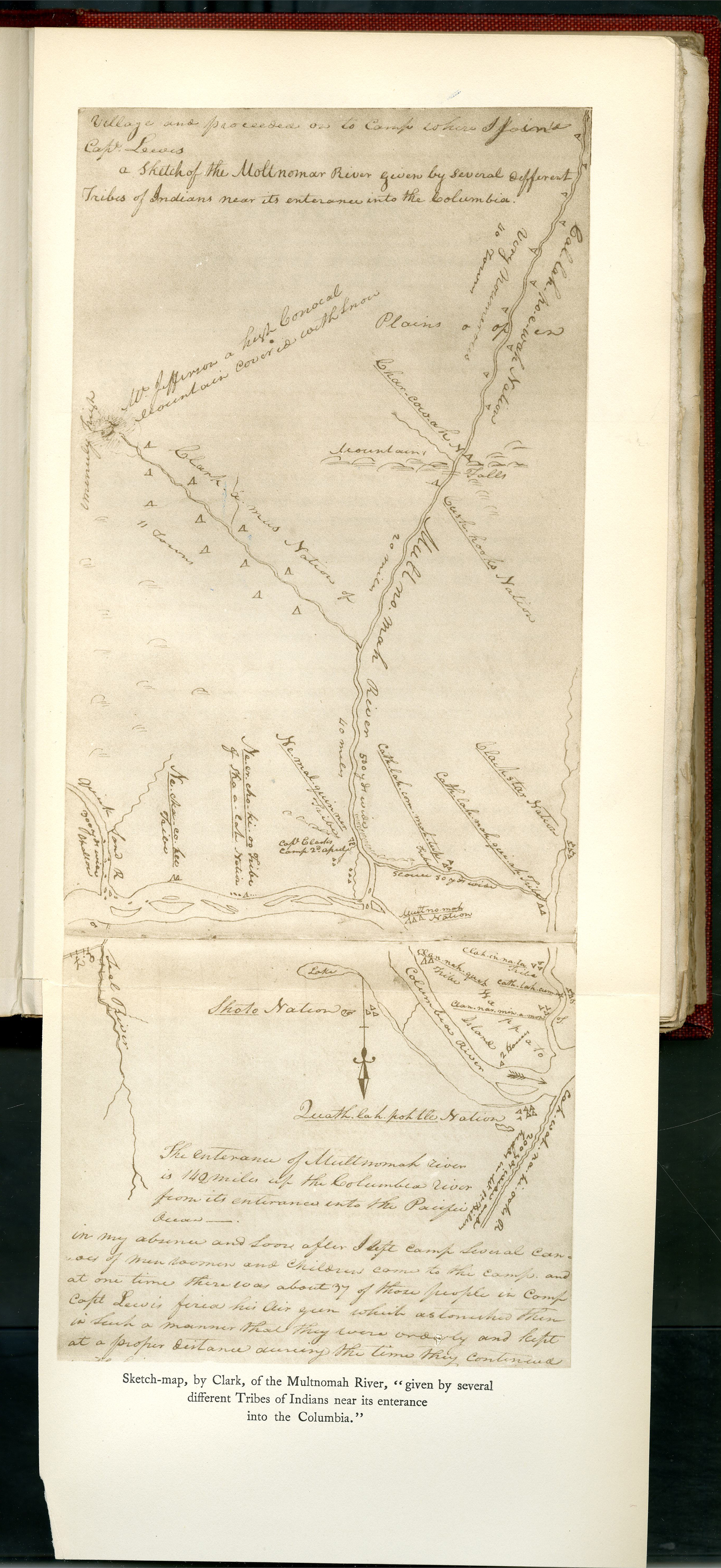Victoria (Wishikin) Wacheno Howard was the teller of Clackamas Chinook narratives and traditions transcribed by anthropologist Melville Jacobs and published by him as Clackamas Chinook Texts (1958-1959), one of the richest records of the Indigenous northwest Oregon storytelling art. While Jacobs referred to her invariably as “a Clackamas Chinook,” Howard’s origins were more complicated, though not unusually so for the tribally and linguistically diverse reservation community into which she was born and spent most of her life.
Victoria (locally, Victoire) Wishikin was born in 1867 on the Grand Ronde Reservation to William Wishikin, a Tualatin (Kalapuyan) tribesman, and Sarah, a daughter of Gwayakiti [ˈɡwɑjɑkʼɪtɪ], the Molalla tribal chief at Grand Ronde. In northwest Oregon, a person’s natal tribal affiliation customarily followed that of his or her father. Victoria Wishikin owed her knowledge of the Clackamas language and culture not to her natal family, but to her maternal grandmother, who primarily raised her (her father having died when she was about eight years old), and her mother-in-law, with whom she lived while married to Dan Wacheno, a son of Daniel Wacheno [wɑˈt͡ʃʼi:nu], the Clackamas tribal chief at Grand Ronde.
Clackamas is also the name linguists apply to the Upper Chinook dialects of the lower Willamette River and the Clackamas River. Victoria’s grandmother, Wagayuthlen [wɑʼɢɑ:juɬən] spoke the dialect used at Willamette Falls. Her mother-in-law, Wasusgani [ˈwɑsusɡɑni] ( or Charlotte), though originally from a Chinookan-speaking group Indigenous to the Cascades of the Columbia River, had lived since a young woman among speakers of her husband’s Clackamas River dialect. Victoria also spoke the Molalla language, though not as fluently as she spoke Clackamas; and by her own account, she had grown up speaking Chinuk Wawa (Chinook Jargon), the original common language of the Grand Ronde Reservation. It is to her “clear English,” as Jacobs characterized it, that we owe not only his field translations of her Clackamas dictations but also a great deal of supplementary information he recorded from her on northwest Oregon Indigenous cultures and history. The multitribal and multilingual complexity illustrated by her life's story was more the norm than the exception on the Grand Ronde Reservation during the late nineteenth century.
Victoria raised perhaps nine children with Dan Wacheno, all of whom predeceased her. The two eventually divorced, and in 1903 Victoria married Eustace Howard, a Santiam Kalapuya speaker from Grand Ronde. While the two remained connected to their Grand Ronde community, they also established a residence at West Linn. That is where Melville Jacobs worked with her beginning in 1928, shortly after assuming a position as professor of anthropology at the University of Washington.
Professor Jacobs dedicated much of his working career to documenting the endangered Indigenous languages and cultures of western Oregon. He was first led to Victoria Howard in hopes of documenting the Molalla language, but on discovering that she was much more fluent in Clackamas, he commenced to transcribe traditional narratives and ethnographic and historical descriptions in that language (1929-1930). During the same sessions, he sampled her knowledge of Chinuk Wawa and made audio recordings of her extensive repertoire of Indigenous songs.
Victoria Howard died of heart failure on September 26, 1930, survived by her husband Eustace, their daughter Agatha (Howard) Howe Bloom, and two granddaughters, Priscilla and Bernice.
-
![Victoria Howard sorting recently gathered hazel shoots, Grand Ronde.]()
Victoria Howard, 1919.
Victoria Howard sorting recently gathered hazel shoots, Grand Ronde. Courtesy Barbara Danforth
-
![The shoots were scorched, soaked, peeled, bleached in the sun, then set aside to season.]()
Victoria Howard, 1919.
The shoots were scorched, soaked, peeled, bleached in the sun, then set aside to season. Courtesy Barbara Danforth
-
![When fully processed, shoots were used to make open-weave baskets and utilitarian ware geared largely to the white market.]()
Lilly Tipton and Victoria Howard.
When fully processed, shoots were used to make open-weave baskets and utilitarian ware geared largely to the white market. Courtesy Barbara Danforth
Related Entries
-
![Chinook Jargon (Chinuk Wawa)]()
Chinook Jargon (Chinuk Wawa)
According to our best information, the name "Chinook" (pronounced with …
-
![Confederated Tribes of Grand Ronde]()
Confederated Tribes of Grand Ronde
The Confederated Tribes of Grand Ronde Community of Oregon is a confede…
-
![Elizabeth Jacobs (1903-1983)]()
Elizabeth Jacobs (1903-1983)
Elizabeth D. Jacobs’s fieldwork with the Nehalem Tillamook and southwes…
-
![Kalapuyan peoples]()
Kalapuyan peoples
The name Kalapuya (kǎlə poo´ yu), also appearing in the modern geograph…
-
![Melville Jacobs (1902-1971)]()
Melville Jacobs (1902-1971)
Melville Jacobs did more to document the languages, cultures, oral trad…
-
![Wapato (Wappato) Valley Indians]()
Wapato (Wappato) Valley Indians
Lewis and Clark called them the "Wappato Indians," the people who inhab…
Map This on the Oregon History WayFinder
The Oregon History Wayfinder is an interactive map that identifies significant places, people, and events in Oregon history.
Further Reading
Chinuk Wawa Dictionary Committee. Chinuk Wawa as Our Elders Teach Us to Speak It. Grand Ronde, Oregon: Confederated Tribes of Grand Ronde. Distributed by University of Washington Press, Seattle, 2012.
Jacobs, Melville. "Texts in Chinook Jargon." University of Washington Publications in Anthropology 7.1 (1936):1–27.
Jacobs, Melville. Clackamas Chinook Texts. Part 1: Folklore and Linguistics Publication 8; Part 2: Folklore and Linguistics Publication 11. Bloomington: Indiana University, 1958-1959.
Jacobs, Melville. The Content and Style of an Oral Literature: Clackamas Chinook Myths and Tales. Chicago: University of Chicago Press, 1959.
Jacobs, Melville. The People are Coming Soon: Analyses of Clackamas Chinook Myths and Tales. Seattle: University of Washington Press, 1960.
Howard, Victoria. Clackamas Chinook Performance Art: Verse Form Interpretations. Catharine Mason, ed. Lincoln: University of Nebraska Press, 2021.
Zenk, Henry. "Victoria Howard's Chinook Jargon in Context." Pages 494-538 in Proceedings of the International Conference on Salish and Neighbouring Languages 60, Ella Hannon et al. eds. Vancouver, BC: UBCWPL [University of British Columbia Working Papers in Linguistics], 2025.
Olson, June. Living in the Great Circle: The Grand Ronde Indian Reservation, 1855-1905. A. Menard Publications, 2011.

